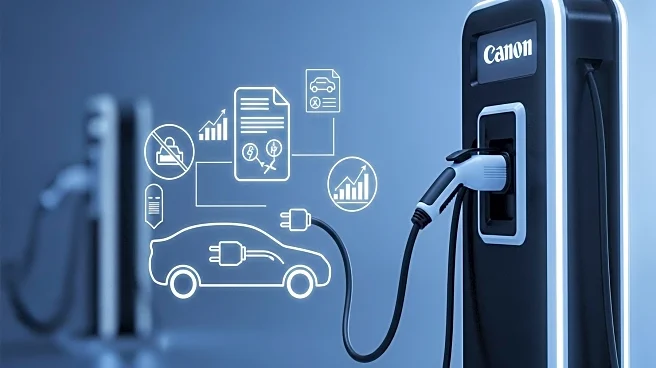What's Happening?
General Motors (GM) has decided to cancel a program that would have allowed its dealers to offer a $7,500 tax credit on electric vehicle (EV) leases beyond the expiration of the federal subsidy on September 30. The program involved GM's lending arm purchasing EVs from dealer inventories and applying for the tax credit before the deadline, intending to incorporate the credit into lease terms for customers. However, GM retracted the plan following concerns raised by Republican Senator Bernie Moreno, who is involved in auto policy. The program aimed to mitigate the impact of the subsidy expiration on dealers worried about selling EVs without the credit.
Why It's Important?
The cancellation of GM's program reflects the complexities of navigating federal policies and subsidies in the automotive industry. The expiration of the EV tax credit poses challenges for dealers and manufacturers, potentially affecting EV sales and market dynamics. GM's decision highlights the influence of political considerations on corporate strategies, as concerns from policymakers can lead to significant shifts in business plans. The situation underscores the importance of federal incentives in promoting EV adoption and the potential repercussions when such incentives are withdrawn.
What's Next?
The automotive industry may face increased pressure to adapt to the changing landscape of EV incentives. GM's decision could prompt other manufacturers to reassess their strategies in response to the subsidy expiration. The industry may advocate for new policies to support EV sales, while dealers might explore alternative approaches to attract customers without the tax credit. The situation could lead to broader discussions on the role of government incentives in advancing sustainable transportation.
Beyond the Headlines
The cancellation of GM's program raises questions about the ethical and legal dimensions of leveraging tax credits in corporate strategies. It highlights the tension between business interests and regulatory frameworks, emphasizing the need for transparent and equitable policies that support industry growth while addressing environmental goals. The development may influence future legislative efforts to balance economic incentives with sustainable practices.










